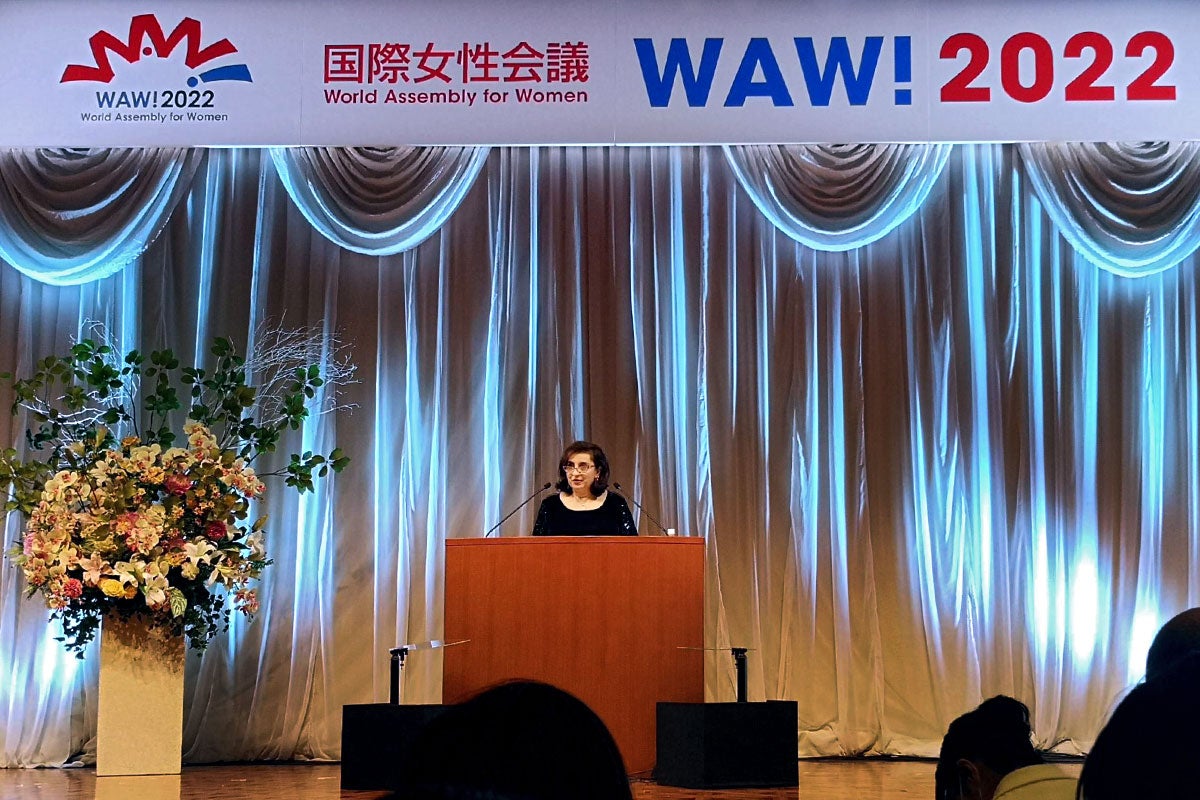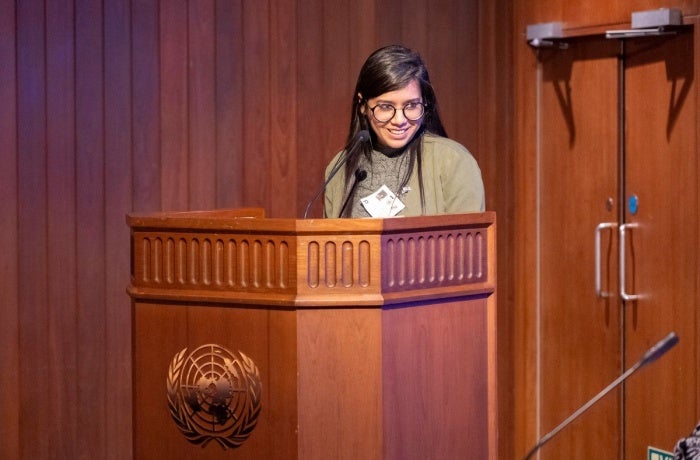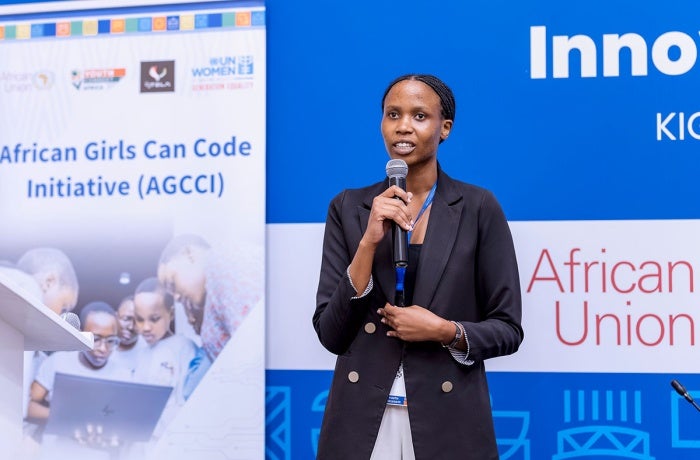Speech: Tackling challenges head on
Keynote speech by Sima Bahous, Under-Secretary-General of the United Nations and Executive Director of UN Women, at the 2022 World Assembly for Women (WAW! 2022), 3 December 2022
[As delivered]
The 2022 World Assembly for Women (WAW!) is a testament of our shared commitment to placing gender equality at the forefront of the multilateral arena. This is both a matter of human rights and a critical path for achieving our Sustainable Development Goals.
WAW! is an opportunity to discuss the unique leadership role that women and girls can and must play in key agendas such as the environment, climate change, energy, finance, public policy and public security and more.

We are now nearly halfway to the 2030 endpoint for the SDGs. Seven more years to go. It saddens me to report that at the current rate of progress, it will not take seven years to achieve gender equality but rather 300 years—this is the latest estimate for the time it will take us to remove the discriminatory laws and close the gaps in legal protections for women and girls. I am sure that none of us here today want to wait 300 years.
Violent conflict, displacement, the growing climate emergency, the repercussions of the global pandemic and vocal anti-feminist movements have reversed generational gains in women’s rights. The consequences of these crises hit women and girls the hardest.
The facts are not in doubt. You are here because you know the situation. But I would like to share a few examples of the fresh urgency of this important meeting.
Violence against women is so pervasive that every 11 minutes one woman or girl in the world is killed by someone in her family. As I speak today, my 11 minutes with you is marred—and marked—by those deaths. And by every 11 minutes that follow—until we put an end to violence against women. We are in the middle of the 16 Days of Activism to End Violence Against Women and Girls. I urge you all to reflect on the statistics, and to increase your own actions to put an end—once and for all—to all violence against women and girls.
Globally, over 380 million women and girls live in extreme poverty on less than US$1.90 a day. That is around three times the population of Japan, all struggling to survive on $1.90 a day.
School and day-care closures due to the COVID-19 pandemic led to an estimated 512 billion additional hours of unpaid childcare globally, all done by women.
These are devastating statistics of suffering, poverty and injustice. The good news is that not only do we know the problems, we also know the solutions. Our task is not working out what needs to be done, but rather mobilizing the will and commitment to do it. We do not have the excuse that this is too complicated, too new, or too expensive. We can do this, and because we can, we must.
I will highlight three cross-cutting areas that can drive the change we need to see. First, protecting and supporting the rights of women and girls as a powerful force for societal change. Second, guaranteeing a full and equal seat at the table for women in decision-making and leadership positions. Third, ensuring that our promises about the pursuit of gender equality are reflected in what we fund.
I commend highly the Kishida Administration for declaring the focus of the WAW on “Mainstreaming Gender into a New Form of Capitalism”. Recognizing the unique role played by women in advancing society, as well as the economic benefits of empowering women, shows foresight and leadership. And I commend the Government of Japan for influencing its own national private sector and pushing for female participation and career advancement, which resulted in an almost-doubling of women in managerial positions from 6.9 per cent in 2012 to 11.2 per cent in 2018. I also commend the Japanese Parliament for pushing strongly this agenda.
Gender inequality is a critical economic challenge. If women—who account for half the world’s working-age population—do not achieve their full economic potential, we are all short-changed. While all types of inequality have economic consequences, a McKinsey Global Institute (MGI) report noted that advancing women’s equality can add US$12 trillion to global growth by 2025. Why would we waste those economic dividends? We must give women equality in the workforce.
Second, progress on SDG 5 will remain out of reach unless long-term structural barriers to gender equality, including discriminatory norms, laws and practices, are addressed and dismantled. WAW! will also be a chance for us to break free from the same stereotypes that have confined women and men in mandated roles and responsibilities. We must use all the tactics at our disposal, including special measures like quotas, to guarantee a seat at the table for women in decision-making and leadership positions. These quotas can be transitional.
The glass ceiling is still intact. In the private sector worldwide, close to 1 in every 3 managers or supervisors is a woman. Women represent only 1 in 4 members of parliament worldwide and are just 34 per cent of those elected to local governments. And higher up the echelons of power, women are even fewer in numbers. They are less than 10 per cent of Heads of State and Government.
Our recently released 2022 Gender Snapshot on progress on the SDGs again lends urgency to our deliberations through its findings. Despite several improvements, especially in local government structures, at the current pace of change, it will take another 140 years—nearly one and half centuries—to achieve parity in women’s representation.
But there are gleams of progress to encourage us. I recognize with satisfaction that Japan has close to 300 companies that have signed up for the Women’s Empowerment Principles, known as WEPs. These offer guidance to business on how to promote gender equality and women’s empowerment in the workplace, marketplace, and community.
Established by the UN Global Compact and UN Women, the WEPs are informed by international labour and human rights standards and are grounded in the recognition that businesses have a stake in, and a responsibility for, gender equality and women’s empowerment. They are a primary vehicle for corporate delivery on the gender equality dimensions of the 2030 Agenda and the United Nations Sustainable Development Goals.
By joining the WEPs community, CEOs signal commitment to this agenda at the highest level of the company. They agree to work collaboratively in multistakeholder networks to foster business practices that empower women. These include equal pay for work of equal value, gender-responsive supply chain practices and zero tolerance against sexual harassment in the workplace. Each of these tackle aspects of the areas I pinpointed earlier, of poverty, gender-based violence, and just inclusion.
So, I am encouraged by the strong commitment of the business community in Japan to adopt and implement the WEPs as well as the Government of Japan’s commitment to promote women’s economic empowerment. Combining these efforts and continuing to dismantle structural barriers for women’s participation can provide a key pathway for a successful post-COVID-19 recovery in Japan and worldwide.
Gender equality is the closest we have to a magic bullet for development and progress. It is the most powerful multiplier of success across the range of our objectives. There is a close correlation between gender equality and stability, resilience, poverty-reduction, growth, and social cohesion. So, SDG5 is fundamental to all SDGs. Without gender equality we cannot achieve any of the Sustainable Development Goals.
A starting point for everything we do must be sound gender analysis that distinguishes the impact of policy choices on women and men. For example, ample evidence shows that if cash transfers are given to women, social safety nets are more effective in delivering on objectives from poverty reduction to child nutrition and education. Yet only a quarter of countries have a comprehensive system to track gender responsive budgeting. This is a glaring missed opportunity.
As we meet here, conflict, climate, and COVID-19 present existential threats. All of us read the news with trepidation. All of us concerned with gender equality bear the perpetual drumbeat of horrifying statistics. We are not here though to commiserate. We are here to assert that we have the roadmap. We know that empowering women and girls to live up to their full potential is the key that unlocks our common challenges. We know that we must create a sea-change in political will, public commitment, and accelerated action. And we will demand exactly that.
Japan will take on the Presidency of the G7 in 2023. I call on Japan to place gender equality and women’s empowerment at the heart of the global agenda in that role and others. I am confident that Japan will do exactly that, with the leadership of Prime Minister Kishida. I know that Japan will also be taking a seat at the UN Security Council and we call also for working on women, peace and security worldwide to help women and girls throughout the crises that our world is facing.
UN Women remains an unwavering partner of Japan as you tackle these challenges head-on.
I look forward to this Assembly’s fruitful discussions and its vital leadership role in bringing the changes that the world so greatly needs.
I thank you.









